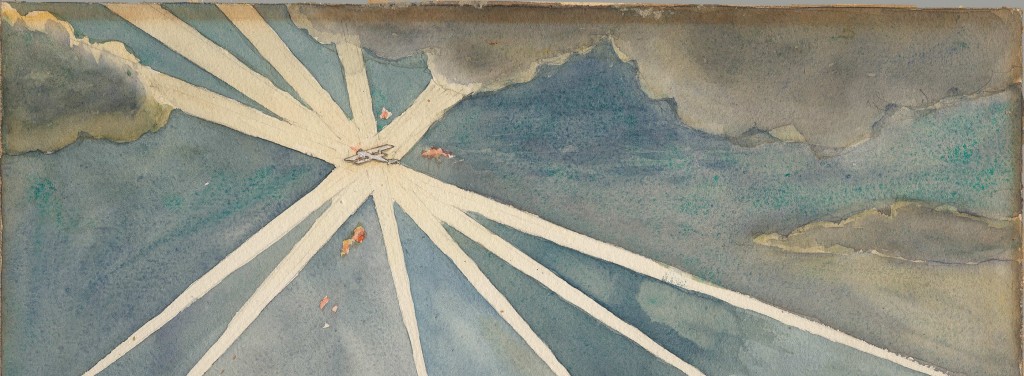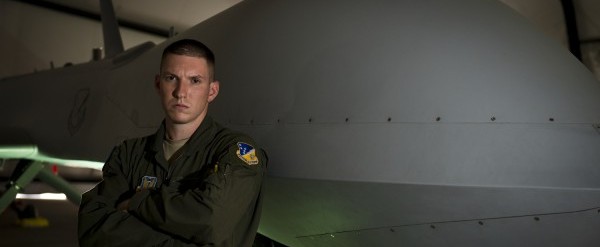The Portals are multimedia collections covering a variety of issues relating to drones. For our full list of portals, click here.
Ever since the American Civil War, when Union and Confederate combatants took to the air in balloons to reconnoiter enemy positions, aircraft have added a new and constantly evolving dimension to war. During the 1920s and ‘30s, American General Billy Mitchell and Italian air power theorist Giulio Douhet argued that large-scale bombing campaigns would make wars shorter. Their theory was duly applied during the Second World War, to devastating effect. From the Vietnam War to today, air power has been at the center of an internal discussion at the Pentagon over whether technological advances in weaponry constitute a “revolution” in military affairs.
The U.S. bombing campaigns in the Middle East in recent years continue to divide opinion on the effectiveness of air power. Over the uncontested airspaces of Iraq, Syria, Yemen, and northwest Pakistan, drones have emerged a fixture of U.S. airpower in these campaigns. In this Portal, we have included lectures on some of the theory and history of military strategy, podcasts on recent conflicts, and panel discussions on the ways that technology disrupt strategy.
This Portal is curated by Dan Gettinger, @GettDan.
Part One: Concepts
- “On Strategy and Strategists” – War on the Rocks // Audio // 00:30:12 // December 4, 2014
What is strategy and who makes it? Lawrence Freedman addresses questions of strategic decision making and political leadership today. Mr. Freedman is one of the most prolific writers and speakers on the theory and history of military strategy. He has been Professor of War Studies at King’s College London since 1982. Event hosted by the Clements Center of the University of Texas at Austin and the King’s College London War Studies Department.
- “Panel Discussion: On Strategy” – Naval War College // Video // 01:10:00 // June 18, 2014
A panel discussion on the historical, theoretical, and practical elements of military strategy. Panelists: Dr. Hal Brands, Duke University; Dr. Aaron L. Friedberg, Princeton University; Dr. John Mauer, U.S. Naval War College”
- “Episode 257: Clausewitz – now more than ever, with Donald Stoker” – Midrats // Audio // 01:01:00 // December 2014
Donald Stoker discusses his latest book Clausewitz: His Life and Work, a biography of the Prussian military theorist Carl von Clausewitz. Donald Stoker is a military historian and a Professor of Strategy and Policy for the U.S. Naval War College’s program at the Naval Postgraduate School in Monterey, California.
- “Clausewitz and Contemporary War” by Dr. Antulio J. Echevarria II – U.S. Army War College // Video // 01:04:00 // July 16, 2014
Dr. Echevarria delves into Clausewitz’s On War and how it applies to modern day conflicts. Dr. Antulio J. Echevarria II is the Director of Research at the U.S. Army War College, a military historian, and a scholar of Clausewitz.
- Martel, William C. “The Making of Future American Grand Strategy.” The National Interest, 27 Jan. 2015. Web. 27 Jan. 2015.
- Cavanaugh, Matt. “300 Word Strategic Education V2.” War Council, 23 Nov. 2014. Web.
- Friedman, Brett. “Strategy as Narrative.” The Bridge, 4 Dec. 2013. Web.

Part Two: Strategic Planning and Assessment
- “A Strategic Analysis of the First Anglo-Afghan War 1839-42: Lessons for Today” – Oxford University // Audio // 00:44:00 // November 9, 2010
Colonel Adam Finlay delivers a strategic analysis of the Anglo-Afghan War of 1839 to 1842 and what lessons that war may hold for conflicts today. Col. Finlay was a visiting fellow at Oxford University’s Changing Character of War Seminar.
- “Strategy for Action: Using Force Wisely in the 21st Century” – Oxford University // Audio // 00:44:00 // October 26, 2012
Commodore Steve Jermy (Royal Navy) gives a lecture for the Ethics, Law and Armed Conflict seminar series at Oxford University on the nature of strategy and the methods for framing strategic thinking and devising superior strategy.
- “Episode 246: When the short snappy war goes long, with Chris Dougherty” – Midrats // Audio // 01:06:00 // October 2014
“As we once again face the promise of a conflict with a limited mission and a strangely ill-defined Strategic and Operational design – what do we need to keep in mind not just from recent history, but the longer term record?” Chris Dougherty is a research fellow at the Center for Strategic and Budgetary Assessments (CSBA).
- “The Third U.S. Offset Strategy and its Implications for Partners and Allies” – Center for a New American Security // Video // 01:18:24 // January 30, 2015
“CNAS and the NATO Allied Command Transformation hosted Robert Work, Deputy Secretary of Defense, who presented his view for how the new U.S. Offset Strategy will impact U.S. alliances and partnerships, including NATO. Following his remarks, there was a discussion moderated by Michèle Flournoy, Co-Founder and Chief Executive Officer at CNAS. She was joined by distinguished guest, General Jean-Paul Paloméros, the NATO Supreme Allied Commander Transformation. An audience Q&A session followed the panel.”
- “Libya: Airpower, SOF, and NTC” Part One and Part Two, by Nick Prime (The Bridge)
- Barno, David, and Nora Bensahel. “The Irrelevance of Traditional Warfare?” War on the Rocks. War on the Rocks, 27 Jan. 2015. Web. 29 Jan. 2015.
Recommended read: Airpower for Strategic Effect by Colin S. Gray, chapter “Strategic History V: Airpower after 9/11.”

Part Three: Drones and Strategy
- “The Future of American Warfighting: Lessons of the Contemporary Battlefield” – The Center for the Study of the Drone and the Carnegie Council for Ethics in International Affairs // Audio // 01:14:00 // February 20, 2014
Noah Shachtman, Patrick Mahaney Jr., and Ben Fitzgerald discuss how drones and other emerging weapons systems will change the way wars are fought.
- “The Implications of Drones on US Foreign Policy” – Council on Foreign Relations // Audio // 00:57:00 // December 4, 2014
“Micah Zenko, CFR’s Douglas Dillon fellow in the Center for Preventive Action, and Sarah E. Kreps, associate professor of government at Cornell University, discuss the increased tactical use of unmanned aerial systems and the ramifications for U.S. foreign policy, as part of CFR’s Academic Conference Call series.”
- “The Evolution of the Battlefield” – Center for Strategic and International Studies // Audio/Video // 01:23:00 // May 20, 2013
“As the ICRC marks 150 years since its founder, Henri Dunant, witnessed the carnage of a battlefield near Solferino, Italy, the ICRC confronts a new, modern battlefield. Vice President Christine Beerli will discuss the changing means and methods of warfare within the context of international humanitarian law, focusing on new armed actors and new technologies. Jim Lewis will offer comments and reflections on today’s technological advances and national security imperatives.”
- “Eighth Annual Conference: Creative Disruption: Strategy, Technology and the Future Defense Industry” – Center for a New American Security // Video // 00:46:00 // June 16, 2014
The Honorable William J. Lynn III, former U.S. deputy secretary of defense and Admiral James Stavridis, USN (Ret.) discuss strategy, technology and the future of the defense industry. Ben FitzGerald, the director of the Technology and National Security Program at CNAS, moderated the panel.
- Whitlock, Craig. “Remote U.S. Base at Core of Secret Operations.” Washington Post. The Washington Post, 25 Oct. 2012. Web. 27 Jan. 2015.
- Trombly, Dan. “Drones and the False Allure of Impunity.” Web log post. Fear, Honor, Interest. 11 Apr. 2012. Web. 27 Jan. 2015.
- “Unmanned Systems Integrated Roadmap 2013-2038” – Department of Defense
Bookshelf
Clausewitz, Carl Von, and Michael Howard. On War. Princeton, N.J.: Princeton UP, 1984. Print.
Gray, Colin S. Airpower for Strategic Effect. Maxwell Air Force Base, Ala.: Air UP, Air Force Research Institute, 2012. Print.
Heuser, Beatrice. The Evolution of Strategy: Thinking War from Antiquity to the Present. Cambridge, UK: Cambridge UP, 2010. Print.
Mahan, A. T. The Influence of Sea Power upon History, 1660-1783. New York: Dover Publications, 1987. Print.
Pape, Robert Anthony. Bombing to Win: Air Power and Coercion in War. Ithaca, N.Y.: Cornell UP, 1996. Print.
Paret, Peter. Makers of Modern Strategy: From Machiavelli to the Nuclear Age. Princeton, N.J.: Princeton UP, 1986. Print.
Blogroll
- Best Defense
- Fear, Honor, Interest
- Grand Blog Tarkin
- Kings of War
- On Violence
- Rethinking Security
- The Bridge
- The Diplomat: James Holmes
- U.S. Naval Institute Blog
- War Council
- War is Boring
- War on the Rocks
Syllabi
- “Studies in Grand Strategy” – Yale University // John Lewis Gaddis, Charles Hill, Paul Kennedy, David Brooks, John Negroponte, and Paul Solman // Spring 2013
- “Comparative Grand Strategy and Military Doctrine” – Massachusetts Institute of Technology // Prof. Barry Posen // Fall 2004
- “Strategy and International Politics” – University of Chicago // Prof. Robert Pape // Spring 2014
- “Guide to National Security Issues: Theory of War and Strategy” – U.S. Army War College // J. Boone Bartholomees, Jr. // Summer 2008
For updates, news, and commentary, follow us on Twitter.
[includeme file=”tools/sympa/drones_sub.php”]

